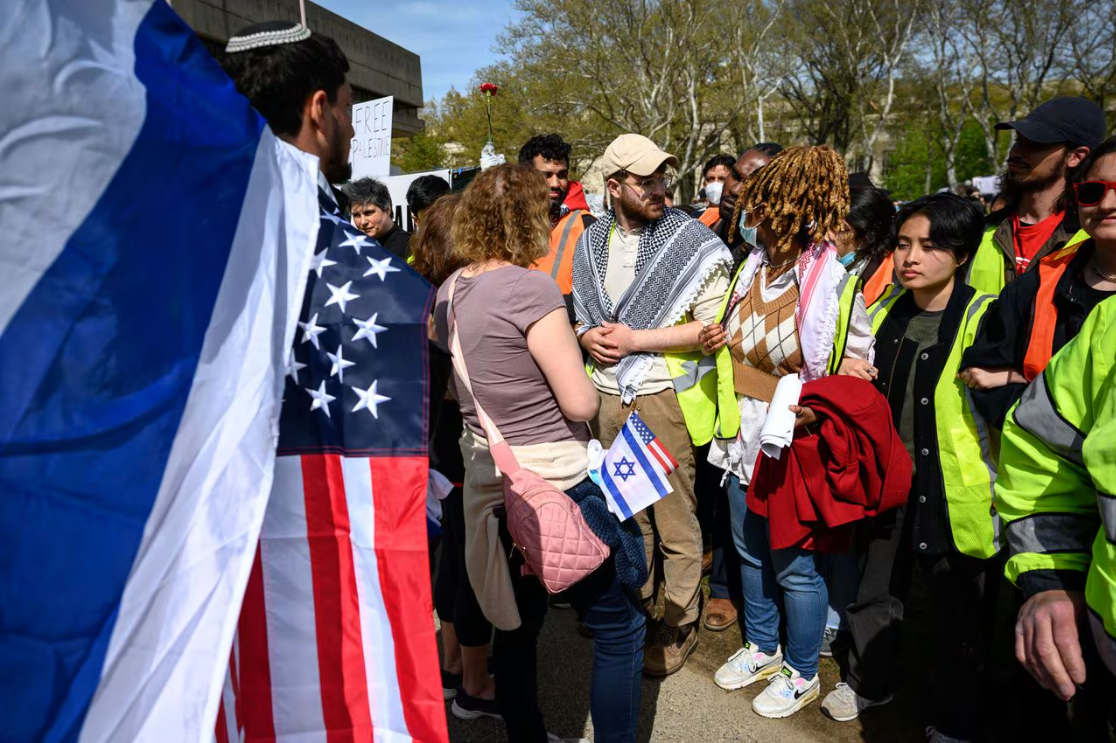在波士顿的各所大学中,营地相互支持,并吸引外部团体的目光

【中美创新时报2024 年 5 月 5 日编译讯】(记者温友平编译)波士顿地区的大学学生组织表示,除了形成一个更大的互相帮助的抗议者社区外,营地中的学生还从外部意识形态团体那里获得法律和物质援助,这些团体被这一新抗议阵线的关注所吸引。这反过来又吸引了外部亲以色列组织来到校园进行反抗议。《波士顿环球报》记者Sean Cotter、Lila Hempel-Edgers 和 Alexa Coultoff 对此作了下述报道。
4 月 25 日一早,麻省理工学院的亲巴勒斯坦营地还算平静,但有消息称,爱默生学院外的营地即将遇到麻烦。
麻省理工学院大三学生伊萨·利根斯 (Isa Liggans) 表示,他和其他抗议者前往波士顿,以表达对那里学生的支持。他们加入了博伊斯顿街附近一条小巷里不断增加的人群,艾默生学生在那里抗议以色列在加沙的报复性战争,准备与警察对峙。
利根斯说,这只是不同营地的学生以非正式方式互相帮助的一个例子。利根斯当天早上在艾默生被捕,并被指控扰乱治安。
“并不是有某个组织控制一切,”他说,“但也许我们会给他们送一些食物或水,或者去提供一些支持。”

这些组织表示,除了形成一个更大的互相帮助的抗议者社区外,营地中的学生还从外部意识形态团体那里获得法律和物质援助,这些团体被这一新抗议阵线的关注所吸引。这反过来又吸引了外部亲以色列组织来到校园进行反抗议。
两周多前,纽约市警察试图驱散哥伦比亚大学的一个营地,并与示威者发生冲突,之后亲巴勒斯坦营地在校园里如雨后春笋般出现。其中一些仍留在波士顿地区,包括哈佛大学和麻省理工学院。4 月底,警方在艾默生市外逮捕了 118 名示威者,两天后又在东北部逮捕了近 100 名示威者,并清理了两个地点的营地。
逮捕记录显示,在艾默生和东北大学被拘留的许多人并没有去他们被捕的机构,而是像利根一样,成为一个松散网络的一部分,他们团结起来互相支持。
波士顿大学大四学生、美国青年民主社会主义者全国协调委员会成员维维安·戴 (Vivian Dai) 表示,她的组织支持在全国各地学校举办露营活动。她在东北部营地工作,随着警方可能进行扫荡的消息传开,她和全市各地的其他抗议者前往那里,随后被捕。
“当我们面临警察暴力迫在眉睫的风险时,我们确实会互相帮助,”戴说。
许多波士顿示威者还获得了法律帮助,主要来自全国律师协会(一个进步的倡导组织)和穆斯林正义联盟(一个总部位于波士顿的非营利组织,专注于为穆斯林辩护,特别是在刑事和社会正义问题上)。
该协会当地分会的执行董事乌尔苏拉·马斯尼-拉托斯(Urszula Masny-Latos)表示,她的组织已经与所有涌现的营地以及想要建立营地的校园领导保持联系。她说,该协会的作用是观察并提供法律建议,但不就抗议策略提供建议。
“无论他们想使用什么策略,我们都会向他们提供有关他们的权利以及他们的行为以后可能产生的后果的信息,”她说。“我们不会给他们建议,也不会告诉他们应该做什么。”
马斯尼-拉托斯表示,该组织在艾默生大学和东北大学提供了法律观察员,并在哈佛大学培训了观察员。
穆斯林正义联盟还向营地提供了食物等物质支持。它还为营地领导人提供了有关消息传递的建议,例如如何与警察和大学管理部门交谈。据其网站称,该组织由个人捐助者和组织资助,包括巴尔基金会和本杰瑞基金会。
该组织的执行董事法特玛·艾哈迈德 (Fatema Ahmad) 表示,该组织还为被捕者提供了会见治疗师、创作艺术并在处理所发生的一切时交谈的场所。
当警察进行扫荡时,她正在艾默生,从营地外拍摄警察的画面。
她说,来自该地区志同道合、不隶属于大学或非营利组织的人们通过捐赠食物和毯子,或者只是一些善意的话语来提供支持。
“社区成员愿意出现并与学生站在一起,”她说。 “此时此刻,学生们受到了很多关注,但社区中也有很多人在奉献。”
其他倡导组织也提供了帮助。社会主义与解放党成员与东北大学和麻省理工学院的组织者制定了战略,警察突袭东北大学营地前几个小时,其成员苏海尔·帕克(Suhail Parker)就在该营地。
“学生运动重振了整个反战运动,”26 岁的帕克说,他是营地中的两打 PSL 成员之一。“这确实具有历史意义,所以我必须来这里。”
其他帮助抗议者的人的身份仍然不明。随着紧张局势加剧,周二,几名带有标记的医务人员背着背包在塔夫茨的营地里闲逛。该组织的多名成员拒绝接受采访或透露他们的隶属关系,他们的衣服上贴着红色医疗十字标志。他们定期建议学生摘下隐形眼镜,以防警察在逮捕时使用化学武器,包括催泪瓦斯。
随着关于营地的争论仍在继续,支持以色列的组织已开始与学生合作,以提高他们一方的知名度。以色列美国全国委员会周五下午在麻省理工学院组织了一次集会,以回应其所说的“持续的反以色列和反犹太示威活动”。
据《纽约时报》报道,该组织由其网站上列出的最高捐款额超过 10 万美元的捐助者资助,并在全国其他校园组织了类似的示威活动,其中包括加州大学洛杉矶分校,上周反抗议者与反战抗议者发生冲突。(反抗议者的隶属关系仍不清楚。)
周五,数百名反抗议者在麻省理工学院和平集会,高呼亲以色列口号,谴责当地校园反犹太主义日益高涨。据传单称,他们的目标是“支持在当地校园持续进行的亲巴勒斯坦抗议活动中面临骚扰、恐吓或暴力的犹太人、以色列裔美国人和以色列学生。”
另一个与反抗议者有联系的团体是波士顿校园相机,这是一个总部位于波士顿的团体,由个人捐款资助,专注于反击校园和媒体上的反以色列言论。 该组织副主任亚历克斯·萨菲安(Alex Safian)表示,周四下午,该组织与哈佛学生合作,他们来到哈佛庭院的营地,唱起了支持以色列的歌曲。
与问题另一方的组织非常相似,Camera 强调,它正在采取支持性的方式,帮助学生分发传单、回答问题,并提供一些“礼物”,例如印有该组织名称的飞盘。
他说,目标是确保亲巴勒斯坦团体不是唯一可见的团体。
“如果你看到的都是反以色列的东西,并且没有亲以色列的人露面,那么自然的假设是所有犹太人都是反以色列的,”他说。 “我们希望我们的学生能够到那里去。”
然而,营地里的一些人对两边的闯入者都保持警惕。
在艾默生被捕的麻省理工学院学生利根斯表示,外部煽动者是他的组织关注的“三骑士”之一,另外还有大学管理人员和警察,因为他们带来了风险。
“我们不知道他们愿意做什么,”利根斯说,“以及他们愿意采取多大的行动。”
不过,尽管他表示营地欢迎任何人前来支持,但他说,“这是我们尽量小心的事情,尤其是当人们过夜的时候,因为我们知道这可能会引发更多问题”,并使营地面临批评 他说,它正在被非学生接管。 “我们真的尽力只在晚上保留麻省理工学院的内容。”
本报告中包含了美联社的材料。
题图:周五,亲以色列抗议者试图进入麻省理工学院的克雷斯吉草坪时,亲巴勒斯坦抗议者手挽手。ANDREW BURKE-STEVENSON FOR THE B
附原英文报道:
Across Boston colleges, encampments support each other — and draw the eyes of outside groups
By Sean Cotter, Lila Hempel-Edgers and Alexa Coultoff Globe Staff and Globe Correspondent,Updated May 5, 2024
The pro-Palestinian encampment at the Massachusetts Institute of Technology was calm early on the morning of April 25, but word was spreading the one outside Emerson College was about to run into trouble.
Isa Liggans, a junior at MIT, said he and other protesters headed to Boston to show support for students there. They joined the growing crowd in an alley off Boylston Street, where Emerson students protesting Israel’s retaliatory war in Gaza were bracing for a faceoff with police.
This is but one example of the informal way students at different encampments have helped each other, said Liggans, who was arrested at Emerson that morning and charged with disturbing the peace.
“It’s not like there’s some organization controlling everything,” he said, “but maybe we send them some food or some water or go give some support.”
In addition to forming a larger community of protesters who help each other, students in the encampments are also getting aid, both legal and material, from outside ideological groups attracted by the focus on this new protesting front, the organizations say. And that, in turn, has helped draw external pro-Israel organizations to campuses to counterprotest.
Pro-Palestinian encampments have sprung up at campuses after police in New York City attempted to break up one at Columbia University more than two weeks ago and clashed with demonstrators. Several remain in the Boston area, including at Harvard University and the Massachusetts Institute of Technology. Police at the end of April arrested 118 demonstrators outside Emerson and, two days later, nearly 100 at Northeastern, and cleared encampments at both locations.
Arrest logs indicate many of those people detained at Emerson and Northeastern did not attend the institution where they were arrested but are, such as Liggans, part of a loose network who rally to support one another.
Vivian Dai, a senior at Boston University and national coordinating committee member of the Young Democratic Socialists of America, said her group supports encampments at various schools around the country. She worked with the Northeastern encampment — and was arrested after she and other protesters from around the city went there as word of a likely police sweep spread.
“We do help each other out when we are at imminent risk of police violence,” said Dai.
Many Boston demonstrators have also had legal help, primarily from the National Lawyers Guild, a progressive advocacy organization, and the Muslim Justice League, a Boston-based nonprofit that focuses on advocacy for Muslims, especially around issues of criminal and social justice.
Urszula Masny-Latos, executive director of the guild’s local chapter, said her organization has been in touch with all the encampments that have sprung up, as well as campus leaders who want to start one. The guild’s role is to observe and provide legal advice, she said, but not to advise on protest strategies.
“Whatever strategies they want to use, we provide them with information about their rights and what consequences of their actions there might be later,” she said. “We don’t give them points or ideas of what they should do.”
Masny-Latos said the organization provided legal observers at Emerson and Northeastern, and trained observers at Harvard.
The Muslim Justice League has also provided material support, such as food to the encampments. It has also given encampment leaders advice on messaging, such has how to talk to police and college administrations. The group is funded by individual donors and organizations, including the Barr Foundation and the Ben & Jerry’s Foundation, according to its website.
Fatema Ahmad, the group’s executive director, said it has also offered locations to people who were arrested to meet with therapists, make art, and talk as they process all that’s happened.
She was at Emerson when police conducted their sweep, filming police from outside the encampment.
She said similar-minded people from the area who are not affiliated with either the colleges or nonprofits have provided support through donations of food and blankets, or simply some kind words.
“Community members are willing to show up and stand with the students,” she said. ”There’s been a lot of focus on the students in this moment, but there’ve been so many people in the community who are giving.”
Other advocacy organizations have offered assistance. Members of the Party for Socialism and Liberation strategized with organizers at Northeastern and MIT, said Suhail Parker, a member who was at the Northeastern encampment several hours before police raided it.
“The student movement has reinvigorated the entire antiwar movement,” said Parker, 26, who was among two dozen PSL members at encampments. “It’s really historic, so I had to be here.”
The identity of others aiding the protesters remains murky. Several people with markings identifying them as medics roamed the encampment at Tufts Tuesday shouldering backpacks, as tensions rose. Multiple members of this group, marked by red medical cross signs duct-taped to their clothing, declined to be interviewed or share their affiliation. They periodically advised students to remove their contact lenses in the event that police used chemical weapons, including tear gas, upon arrest.
As debate over the encampments continues, organizations that support Israel have begun to work with students to increase their side’s visibility. The national Israeli American Council organized a rally Friday afternoon at MIT in response to what it described as “the ongoing anti-Israel and antisemitic demonstrations.”
The organization, funded by donors with the highest tier of giving listed on its website topping $100,000, has organized similar demonstrations at other campuses across the country, including UCLA, where counterprotesters clashed with antiwar protesters last week, The New York Times reported. (The affiliations of the counterprotesters remain unclear.)
Hundreds of counterprotesters rallied peacefully at MIT Friday, chanting pro-Israel slogans and decrying what they described as growing antisemitism on local campuses. Their goal, according to a flier, was to “support embattled Jewish, Israeli-American, and Israeli students who are facing harassment, intimidation, or violence amid the ongoing pro-Palestinian protests on local campuses.”
Another group affiliated with counterprotesters is Camera on Campus of Boston, a Boston-based group funded by individual donations that focuses on countering what it deems anti-Israel narratives on campus and in the media. On Thursday afternoon, it worked with Harvard students who approached the encampment in Harvard Yard and sang pro-Israel songs, said Alex Safian, the group’s associate director.
Much like organizations on the other side of the issue, Camera stressed that it’s taking a supportive approach, helping students with fliers, answering questions, and providing some “swag” such as frisbees with the organization’s name on it.
The goal, he said, is to make sure the pro-Palestinian groups are not the only ones who are visible.
“If all you see are anti-Israel stuff and no pro-Israel people show their faces, then the natural assumption is that all Jews are anti-Israel,” he said. “We want our students to be out there.”
Some of those at the encampments, however, are leery of interlopers on either side.
Liggans, the MIT student who was arrested at Emerson, said outside agitators are among the “three horsemen” of his group’s concerns, along with college administrators and the police, because of the risk they introduce.
“We don’t know what they’re willing to do,” Liggans said, “and how far they’re willing to act.”
But while he said the encampment welcomes anyone showing up in support, he said, “that’s something we try to be careful with, especially when people are sleeping over because we know it could raise more issues,” and open the encampment up to criticism that it’s being taken over by non-students, he said. “We really try to keep it MIT-only at night.”
Material from the Associated Press was included in this report.

